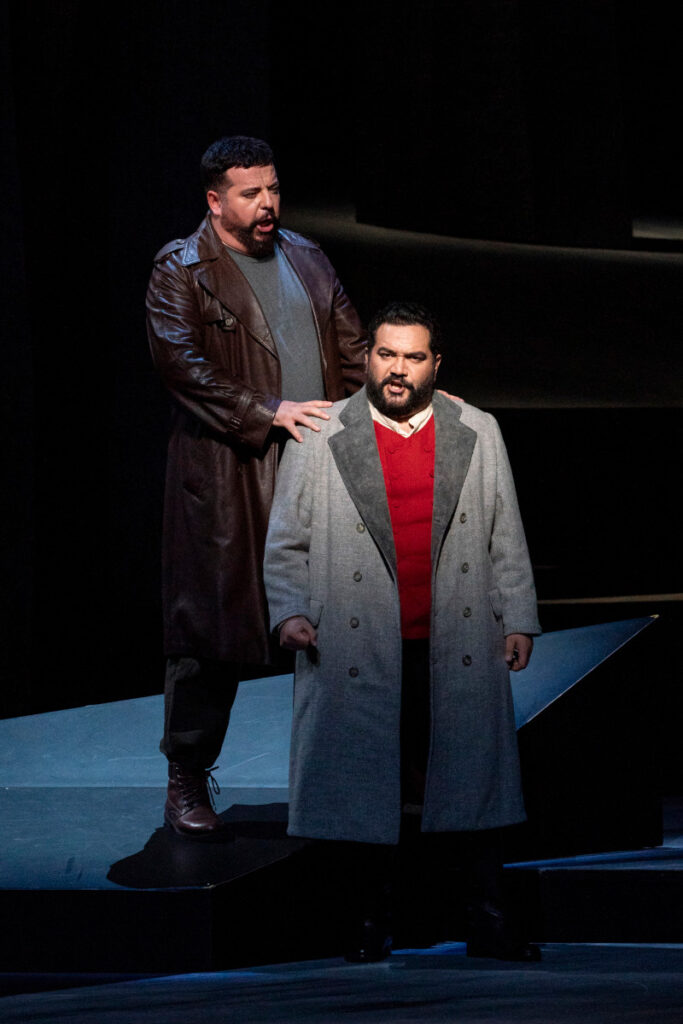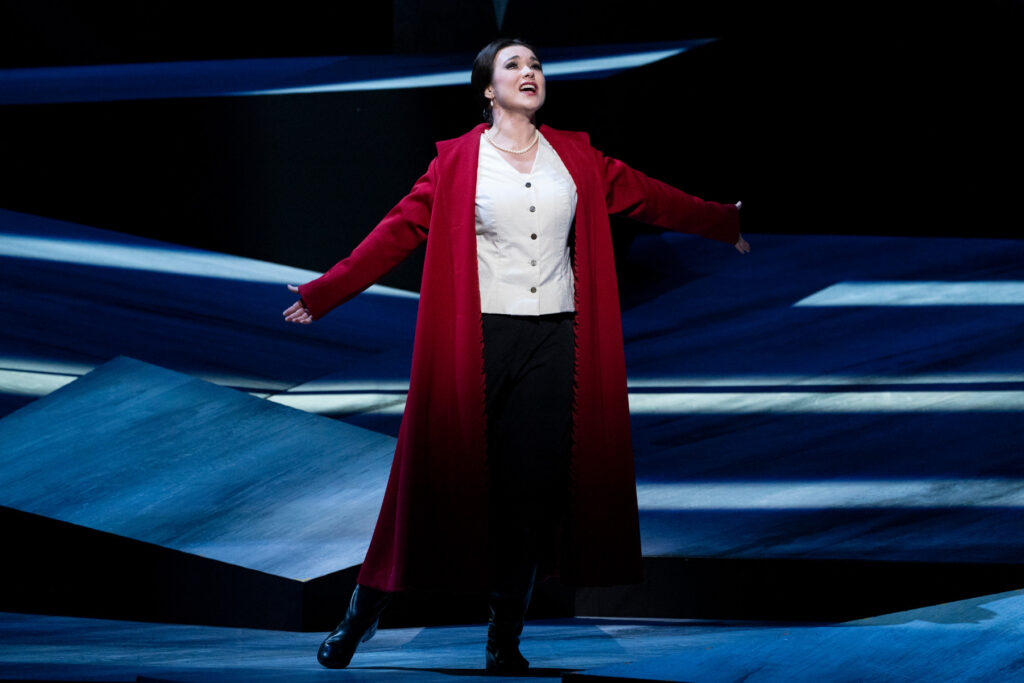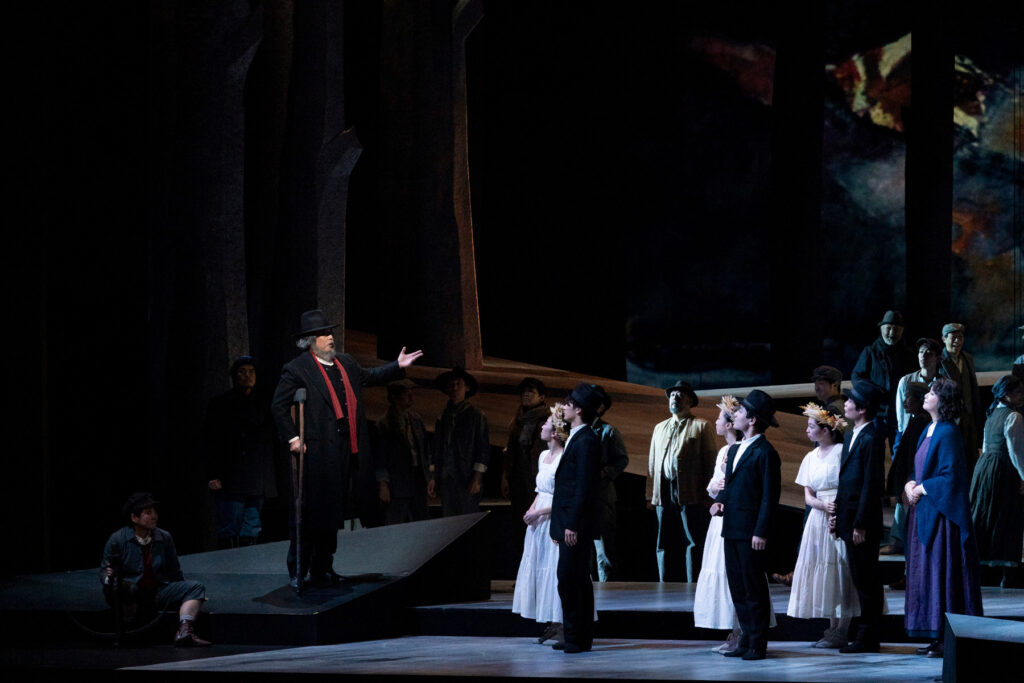To most Japanese, the overture of Guillaume Tell (William Tell) is familiar, evoking memories of Sports Day at elementary school. Nevertheless, this was the first full-scale staged production of Rossini’s final and arguably greatest opera in its original French here in Japan. Thus, on November 23, the NNTT was filled with an expectant audience, and passionate conversations could be heard during the intervals. In the foyer, a generous display of original letters and music by Rossini, along with illustrations of the singers who premiered Guillaume Tell in 1829, added to the sense of a special occasion.
Drawing inspiration from Friedrich Schiller’s 1804 play of the same title, the opera features the major themes of budding Romanticism: nature and humans’ aspiration for individual and collective emancipation. Originally set during the Swiss fight for independence from the Austrian Empire, the story follows the conflict between the occupying army led by Gesler and the oppressed rural community guided by Guillaume Tell, a simple man who embodies its values. In this dualistic world, the figures of Arnold, a Swiss patriot whose father is killed by Gesler, and Mathilde, an Austrian princess, bring doubt and ambiguity through their passionate love, confronting difficult moral choices. In the end, Arnold, who rejoins the rebels, chooses to stay with his people, while Mathilde, having lost everything, finds herself alone.

The legendary director Yannis Kokkos approached this work with “a vision beyond the times” and translates the period by “inventing an aesthetic universe that renders the situations and the people closer to us” (Production Note). Following the heart-rending cello ensemble of the overture, the curtain rises on a storm. An abstract, immutable forest appears on stage, representing “the permanence of nature and humans’ relationship with this setting that nourishes, protects, destroys, and enchants them” (ibid.). Into this sombre forest, as the musical storm explodes, large metallic arrowheads descend one by one, threatening the people below, clad in earth colours. As the pastoral calm returns, with the ranz-des-vaches played beautifully by the cor anglais and flute in turn, the arrowheads are silently withdrawn. They reappear at the end of Act 2, when the trio of Tell, Arnold, and their comrade Walter Furst swear an oath of vengeance against Gesler.
Kokkos’s masterful use of colours adds depth and nuance to the production, enhancing its emotional and visual impact. Among the cast clad in earth colours, including the title role, the appearance of various people dressed in red was truly striking. At first glance, it seemed that the red is associated with the people in power: Melchtal (Arnold’s father, village patriarch), Arnold, Mathilde and Gesler. But then what is symbolised by the red sweater worn by Jemmy, Tell’s son? Could it be his connection to these influential figures, hinting at his potential future role in the resistance – or even, intriguingly, a possible turn towards dictatorship?

Kokkos’s limited yet effective handling of projections adds another layer of sophistication to the production. In Act 4, when a fierce storm erupts over the lake, the entire stage is flooded with a projection of sea-like waves. Equally compelling is the final tableau of the opera. While the whole cast (except Mathilde) sings a great prayer of thanksgiving, immersed in the grand, almost hypnotic ranz-des-vaches-themed orchestration, an image of bombed buildings slowly emerges in the background. This vivid projection – evoking recent images of Gaza and Ukraine – conveys a powerful and haunting contrast, blending a sense of historical continuity with the tragic imagery of modern devastation.
The cast was formidable. In the title role, Albanian baritone Gezim Myshketa embodied traditional masculinity with his powerful, penetrating voice. His portrayal of this unexpected hero’s journey – as a loving and reliable husband, father, and friend – resonated deeply with the audience. His natural yet commanding presence in the first two acts made a stark contrast with the iconic apple scene in Act 3, where his vulnerability, both vocally and physically, was first manifest. His poignant “Sois immobile,” in which he implores his son to remain calm and think of his mother during this ordeal, was undoubtedly the evening’s emotional high-water mark.

Mexican-American tenor René Barbera made an astounding debut in the role of Arnold. His glorious, superbly controlled voice and emotional intensity brought a profound depth to the character, making every scene he was in compelling and memorable. While showing his utmost tenderness in his duet with Mathilde in Act 2, Barbera’s Arnold underwent a remarkable transformation in his dramatic trio with Tell and Walter. His most impressive moment came at the end of the opera with his lamenting aria “Asile héréditaire” and the subsequent “Amis, amis, secondez ma vengeance,” where Barbera rang out the recurring high Cs triumphantly with apparent ease, enthralling the audience.
As Mathilde, Russian soprano Olga Peretyatko epitomized elegance with a touch of aloofness. Her entrance aria “Sombre forêt” in Act 2 was delightful, with captivating messa di voce in the line “Mais l’écho seulement.” Her trio “Je rends à votre amour” with Tell’s wife and son in Act 4 was equally splendid.
The rest of the roles were entrusted to Japanese singers. Yoko Yasui’s portrayal of Jemmy as a lively, somewhat defiant youth was enjoyable to watch. Her clear soprano soared over the orchestra in every scene. As Gesler, bass Hidekazu Tsumaya opted for a giggling, almost sadistic depiction of a dictator clad in a Nazi-like uniform. On the other end of the spectrum, bass Taiki Tanaka brought a more introspective presence to the stage in his role as Melchtal. Their deep voices matched their contrasting roles admirably. Baritone Shingo Sudo’s portrayal of Walter was utterly convincing and memorable throughout, especially at the pivotal moment in Act 2 when he disclosed that Arnold’s father had been brutally murdered by Gesler. As the fisherman Ruodi, tenor Yasuhiro Yamamoto succeeded in hitting the very first high C in this lengthy opera. Toshiaki Murakami as Rodolphe (Captain of Gesler’s bodyguard), Hiroyuki Narita as the shepherd Leuthold, and Junko Saito as Tell’s wife Hedwige also showed an assured vocal presence.
Last but not least, the NNT Chorus delivered an outstanding performance in this Grand Opéra. Their vigorous singing and exceptional acting elevated the entire production. Equally stunning were the dance sequences choreographed by Natalie van Parys, masterfully integrated into the storyline. In particular, the sophisticated choreography in Act 3, where the humanoid-looking soldiers of both sexes force abducted brides to dance, effectively conveyed the covert violence of the drama. In the pit, Kazushi Ono conducted the orchestra with unwavering determination.
With a supreme cast and staff, Kokkos’s mission to “restore the work’s modernity brought by its musical innovations and ensure that its first aspect as an unusually long ‘staged oratorio’ can be perceived as a dramatic theatre work transfigured by music and action” (Production Note) was expertly accomplished.
Natsuko Hirakura
Guillaume Tell
Composed by Gioachino Rossini
Libretto by Victor-Joseph Étienne de Jouy and L. F. Bis, based on Friedrich Schiller’s play Wilhelm Tell
Cast and production staff:
Guillaume Tell – Gezim Myshketa; Arnold Melchtal – René Barbera; Walter Furst – Shingo Sudo; Melchtal – Taiki Tanaka; Jemmy – Yoko Yasui; Gesler – Hidekazu Tsumaya; Rodolphe – Toshiaki Murakami; Ruodi – Yasuhiro Yamamoto; Leuthold – Hiroyuki Narita; Mathilde – Olga Peretyatko; Hedwige – Junko Saito; Un chasseur – Shoji Sato
Conductor – Kazushi Ono; Production, Set and Costume Design – Yannis Kokkos; Artistic Collaborator – Anne Blancard; Lighting Design – Vinicio Cheli; Video Scenography – Eric Duranteau; Choreographer–Natalie van Parys
New National Theatre Chorus, Tokyo Philharmonic Orchestra
New National Theatre Tokyo, Saturday the 23rd November 2024
All photographs © Rikimaru Hotta